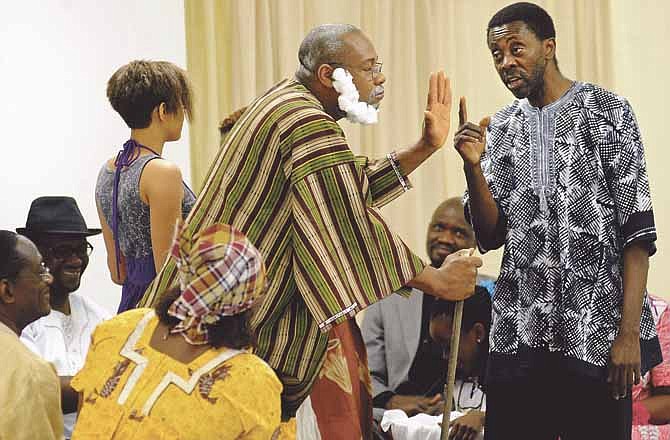Flavors, fashions and family traditions expressed the culture of Sierra Leone Saturday.
The Jefferson City Sierra Leone Association held its annual fundraiser dinner for nearly 200 guests at the Masonic Lodge.
Most members of the Sierra Leone Association are immigrants and their families. Some, like Bernard Collier, have been in the U.S. for more than 20 years, coming as students to Lincoln University in Jefferson City.
Others, like his mother, Alice Bernard-Jones, found shelter in America when civil war broke out in their west African home about 15 years ago.
The association chose to help educate the young generation in Sierra Leone with scholarships.
In the past 14 years, they have helped 23 individuals, some now professionals or in college.
The scholarships are particularly meaningful to girls, Bernard-Jones said. Education is not publicly paid for in Sierra Leone, so if parents must choose between sending a son or daughter, it is the boy, she said.
"There are limited opportunities for girls," Bernard-Jones said. As the oldest member of the association, his mother is a mother-figure to everyone, Collier said. She has the same connection to the children they support in Sierra Leone.
"I'm a universal Auntie Alice," she said.
Saturday's event will help support seven students in high school in Freetown, the capital.
"A high literacy rate with a high school education improves their chance for a better life," Collier said.
Gifts from this weekend's dinner, as well as the association's annual Thanksgiving celebration in October, also support orphanages.
Many of the 50 members also are members of the Grace Episcopal Church, which has been supportive of the association's scholarships, too, Collier said. This year's fundraising event was expanded from the dinner format of the past, Collier said. Food-tasting, a skit "Seeking a Rose," and an "Africana" fashion show made for an entertaining evening. "We wanted to keep it fresh," Collier said. And "we're looking to do more, exposure-wise, to broaden our donor base." Based on a traditional engagement ceremony in Sierra Leone, "Seeking A Rose" was directed by Edith Kamara and Manfred Johnson.
The directors wrote some parts, but for the most part, participants were familiar with their roles in the traditional ceremony, Kamara said.
"We wanted to show people a part of our culture," Kamara said.
Preparing food to serve up to 200 guests is not new for Felicia John, who has helped with many of the association's past scholarship and Thanksgiving dinners.
John was proud to share the benefits of using sweet potato leaves, as well as the fruit, in foods such as the stewed potato greens or peteteh leaf. Served with white rice, the young potato leaves are a popular vegetable in several African countries.
For many of the children in the association, they were not born in Africa, so these traditions are new to them, too, said Sadia King.
After seeing another Sierra Leone association host a runway-style fashion show, King decided that could be done in Jefferson City.
King came to the U.S. when she was 21. So the fashion show garments were true to her memory. "Just like when you're a little girl and played dress up; it's fun," King said.
Some of the pieces association members owned, others were made for the event.
"In Africa, we are very flamboyant," King said.
She recruited Jefferson City High School students, Lincoln University alumni, and young professionals as models. They have varied backgrounds from Sierra Leone, Cameroon, Nigeria, Congo and the United States.
"When I saw their excitement, then it motivated me," King said.
"This was very different; a different culture," Martin said. But she enjoyed learning the language and the styles, Martin said. In particular, she liked the gele, a specially tied lady's headwrap.
The men's clothing was familiar to Moses Tucker, who moved the U.S. from West Africa when he was age 13.
"This makes me proud of my culture, where I'm from," said Tucker, a former U.S. Marine. "This is a way to give back to my community; it's awesome."

